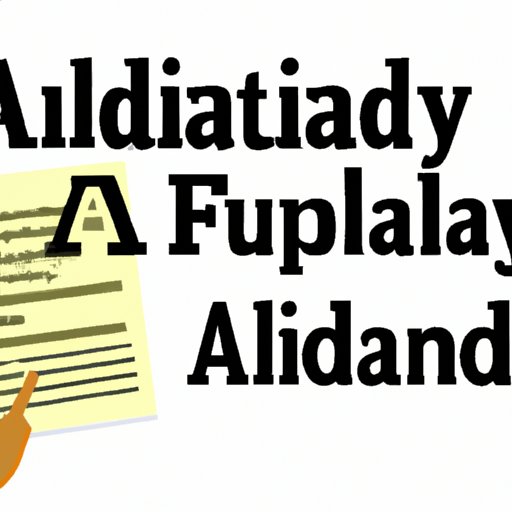Introduction
Financial aid is an important resource for many individuals and families who are seeking to pay for college or other post-secondary education. It can be used to cover tuition, fees, books, and living expenses. To be eligible for financial aid, students must meet certain criteria. In this article, we will explore the different types of financial aid available, who is eligible for it, and how to apply.
Overview of Financial Aid
Financial aid is money that helps students pay for college or other post-secondary education. It is provided by federal and state governments, colleges and universities, private organizations, and other sources. The most common types of financial aid include grants, loans, scholarships, and work-study programs.
The primary benefit of financial aid is that it can help reduce the cost of college or other post-secondary education. Additionally, it can help make college more accessible and affordable for students who may not otherwise be able to attend due to financial constraints.
Exploring the Eligibility Requirements for Financial Aid
In order to be eligible for financial aid, students must meet certain criteria. This includes academic performance, income, dependency status, and other factors. To determine eligibility, students must complete the Free Application for Federal Student Aid (FAFSA). This application collects information about the student’s family and finances, which is then used to calculate the Expected Family Contribution (EFC). The EFC is used to determine the student’s level of financial need.

Common Types of Financial Aid
There are several types of financial aid available to students. The most common types include:
- Federal grants and loans
- State aid
- Scholarships and grants

Qualifying Criteria for Financial Aid
In order to qualify for financial aid, students must meet certain criteria. These criteria vary depending on the type of financial aid being applied for. Generally, students must demonstrate financial need, maintain satisfactory academic progress, and be enrolled in an eligible program.
How to Qualify for Financial Aid: A Comprehensive Guide
To qualify for financial aid, students must first understand the requirements. They should also familiarize themselves with the application process and be prepared to submit documentation. Here is a comprehensive guide to qualifying for financial aid.
Understanding the Requirements
The first step in qualifying for financial aid is understanding the requirements. Students should research the types of financial aid available and familiarize themselves with the eligibility criteria. They should also review the application process and gather any necessary documents.
Applying for Financial Aid
Once students understand the requirements, they can begin the application process. To apply for financial aid, students must complete the FAFSA. This application collects information about the student’s family and finances, which is then used to calculate the Expected Family Contribution (EFC). The EFC is used to determine the student’s level of financial need.
Students should also research additional forms of financial aid, such as scholarships, grants, and work-study programs. Many of these programs have their own applications and eligibility criteria.
The Most Common Types of Financial Aid and Who Is Eligible
There are several types of financial aid available to students. Here is a look at some of the most common types of financial aid and who is eligible for them.
Federal Grants and Loans
Federal grants and loans are offered by the U.S. Department of Education. To be eligible for these programs, students must demonstrate financial need and meet other criteria. These programs are open to undergraduate and graduate students.
State Aid
Many states offer their own financial aid programs. To be eligible for these programs, students must meet certain criteria, such as residency requirements and academic performance. Additionally, some states may require students to demonstrate financial need.
Scholarships and Grants
Scholarships and grants are offered by colleges, universities, private organizations, and other sources. To be eligible for these programs, students must meet certain criteria, such as academic performance, community service, or specific interests. Scholarships and grants are usually merit-based and do not require repayment.

What You Need to Know About Financial Aid Eligibility
When applying for financial aid, students should be aware of the eligibility criteria. Here is what you need to know about financial aid eligibility.
Establishing Your Eligibility
To establish your eligibility for financial aid, students must complete the FAFSA. This application collects information about the student’s family and finances, which is then used to calculate the Expected Family Contribution (EFC). The EFC is used to determine the student’s level of financial need.
Financial Need
Financial need is an important factor in determining eligibility for financial aid. To qualify for need-based financial aid, students must demonstrate that they have a financial need. This is determined by comparing the student’s EFC to the cost of attendance.
Maintaining Eligibility
To maintain eligibility for financial aid, students must continue to meet the criteria. This includes maintaining satisfactory academic progress, meeting income requirements, and other criteria. Students should also be aware that financial aid awards can be reduced or canceled if the student fails to meet the criteria.
What Are the Criteria for Getting Financial Aid?
To be eligible for financial aid, students must meet certain criteria. These criteria vary depending on the type of financial aid being applied for. Generally, students must demonstrate financial need, maintain satisfactory academic progress, and be enrolled in an eligible program.
Additionally, students must meet certain income requirements. For example, students whose parents earn less than $50,000 per year may be eligible for need-based financial aid. Additionally, students must also meet certain academic requirements, such as GPA and test scores.
Finally, students must meet certain dependency requirements. Dependency status is determined by the FAFSA and is based on whether the student is financially dependent on their parents or not. Students who are considered independent are more likely to qualify for financial aid.
Financial Aid 101: Who Is Eligible and How to Apply
Financial aid is an important resource for many individuals and families who are seeking to pay for college or other post-secondary education. To be eligible for financial aid, students must meet certain criteria and understand the application process. Here is a comprehensive guide to financial aid eligibility and how to apply.
Understanding the Application Process
The first step in applying for financial aid is understanding the application process. Students should research the types of financial aid available and familiarize themselves with the eligibility criteria. They should also review the application process and gather any necessary documents.
Submitting Documentation
Once students understand the requirements, they can begin the application process. To apply for financial aid, students must complete the FAFSA. This application collects information about the student’s family and finances, which is then used to calculate the Expected Family Contribution (EFC). The EFC is used to determine the student’s level of financial need.
Preparing for Review
After submitting the FAFSA, students should prepare for the review process. This includes gathering any additional documentation that may be required. Additionally, students should research additional forms of financial aid, such as scholarships, grants, and work-study programs.

Student Guide to Financial Aid Eligibility Requirements
Financial aid can help make college more accessible and affordable for students who may not otherwise be able to attend due to financial constraints. To be eligible for financial aid, students must meet certain criteria. Here is a comprehensive guide to financial aid eligibility requirements.
Understanding Your Options
The first step in qualifying for financial aid is understanding the requirements. Students should research the types of financial aid available and familiarize themselves with the eligibility criteria. They should also review the application process and gather any necessary documents.
Researching Opportunities
Once students understand the requirements, they should research additional forms of financial aid, such as scholarships, grants, and work-study programs. These programs may have their own eligibility criteria, so students should be sure to research each one thoroughly.
Applying for Financial Aid
Once students have researched their options, they can begin the application process. To apply for financial aid, students must complete the FAFSA. This application collects information about the student’s family and finances, which is then used to calculate the Expected Family Contribution (EFC). The EFC is used to determine the student’s level of financial need.
Conclusion
Financial aid is an important resource for many individuals and families who are seeking to pay for college or other post-secondary education. To be eligible for financial aid, students must meet certain criteria. This includes academic performance, income, dependency status, and other factors. Students should also be aware of the application process and be prepared to submit documentation. By understanding the requirements and researching their options, students can take advantage of the financial aid opportunities available to them.
(Note: Is this article not meeting your expectations? Do you have knowledge or insights to share? Unlock new opportunities and expand your reach by joining our authors team. Click Registration to join us and share your expertise with our readers.)
